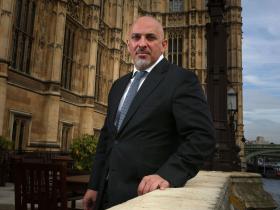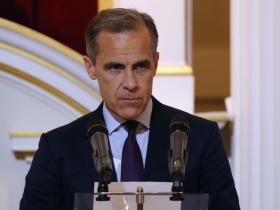Protestant unionists are queuing for Irish passports in Belfast and once quiet Catholic nationalists are openly campaigning for a united Ireland, signs of deep shifts in the United Kingdom's most troubled province since Britain voted to leave the EU.
Eighteen years after a peace deal ended decades of fighting between mainly Catholic nationalists who favor a united Ireland and mainly Protestant unionists who favor remaining part of the United Kingdom, Britain's Brexit vote is making people on both sides of the divide in Northern Ireland think the unthinkable.
Northern Ireland, like neighboring Scotland, voted to stay in the European Union, with 56 percent in favor, even though Britain as a whole voted to leave the bloc.
"I was always a 'small u' unionist. But I could not in all good conscience say I could vote for Northern Ireland to remain a member of the United Kingdom," said Christopher Woodhouse, a 25-year-old from Belfast.
"I am softening to the idea of Irish unity, purely on economic issues," he said. "I am a European."
For years, a firm majority of people in Northern Ireland -- many Catholics as well as nearly all Protestants -- have favored continuing as part of the United Kingdom, drawn to the status quo as a guarantee of stability and prosperity.
But that has been jeopardized at a stroke by the prospect that Britain could quit the European Union and Scotland break away from the United Kingdom.
The Brexit referendum suggests a new center ground could form of people from both faith communities who fear the economic uncertainty of leaving the EU.
"People are saying for the first time in their life they would vote for united Ireland, having never contemplated it before," said Steven Agnew, the leader of the Green Party in Northern Ireland.
CORNERSTONE OF PEACE
The membership of both Ireland and Britain in the European Union was a cornerstone of the 1998 agreement that ended the fighting over whether the predominately Protestant six counties of northeast Ireland should be British or Irish.
EU rules ensure free trade and travel, and allow British or Irish citizens to work, claim benefits and be treated in hospitals in either country. People living on either side of the border may hold either passport or both, with little practical effect on how they are treated by either state.
Although Northern Irish citizens are entitled to passports from Ireland, many unionists would not apply for them. But there were several unionists in a queue seeking Irish passport application forms at the main post office in Belfast this week.
One said she was shocked and disappointed by the Brexit vote, and saw an Irish passport as the only way to retain her EU citizenship. None would give their names, as applying for an Irish passport can be controversial among unionists.
COSTS OF LEAVING
Quitting the EU would have direct costs on a poor province that relies on it more than other parts of the United Kingdom.
Northern Ireland's largest bank, Ulster Bank, said uncertainty around the terms for Britain's exit from the EU could make Northern Ireland a "no-go zone" for some foreign direct investment. Brexit could cause lower growth, higher unemployment and cutbacks in government spending.
"My stomach is churning at all that's happening," said Robert McClenaghan, an Irish Republican Army member turned community worker, describing the potential loss of hundreds of millions of euros of EU funds for former militants, victims groups, and cross-community youth work.
"We are in danger of a return to conflict - at a low intensity level - if those funds are taken away," he said.
Many believe the biggest threat to the peace would be the appearance of some kind of border checks. The huge military checkpoints that dotted the border were dismantled in the wake of the peace deal.
Pro-Brexit politicians have said the Irish frontier would remain open once Britain leaves the EU, but Remain supporters say this would be impossible if Britain wants to limit migration from EU countries whose nationals are free to enter Ireland.
"If they put a border up, the dissidents will blow it up," said Sid Johnson, a 68-year-old unionist Leave voter shopping on Belfast's Shankill Road. If the police are forced to send in armed men to defend the posts, he said, escalation could be swift.
Under the peace deal, the largest nationalist party, Sinn Fein, co-rules the province with the unionist DUP, which campaigned for Britain to leave the EU.
Sinn Fein's party chairman pounced on the Brexit vote, saying it meant Britain had "forfeited any mandate to represent the interests of people here".
The party later cooled its rhetoric, with Deputy First Minister Martin McGuinness saying a united Ireland referendum should be held "at some stage in the future". The party this week held the first of a series of rallies for a united Ireland.
A united Ireland has been the cherished dream of Irish nationalists since Northern Ireland was formed by Britain to protect the large Protestant community in the island's northeast from the Catholic dominated state formed to the south in 1921.
More than 3,600 people died in fighting between the late 1960s and late 1990s, between Catholics who said they were denied basic human rights and wanted to join Ireland and Protestants defending the union with Britain.
Under the 1998 peace deal, the British government was given the power to call a referendum if it appears likely a majority of those voting would seek to form part of a united Ireland.
While higher birth rates among Catholics suggest they will become the majority in Northern Ireland within a generation, opinion polls have consistently shown as many as half of Catholics still favored the stability of the United Kingdom.
But if Brexit makes that Catholic support for the union slip away, a future referendum on Irish unification could be "very, very tight" said Peter Shirlow, head of the Institute of Irish Studies at the University of Liverpool.
"Unionists would have to rely on Catholics not wanting to be part of a united Ireland. That has been the trend up to last Friday," he said. "But I think that trend is now changing."
(Writing by Conor Humphries; editing by Guy Faulconbridge and Peter Graff)


